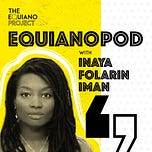In a recent episode of EquianoPod, host Ada Akpala, Head of Content for The Equiano Project, delves into the complex world of multiculturalism, immigration, and cultural diversity. Joined by guest expert Jens Heycke, an independent researcher and writer on culture and ethnic conflict, the podcast offers a thought-provoking exploration of one of the most pressing issues facing modern societies.
Akpala opens the discussion by highlighting the global relevance of multiculturalism, from Stockholm to Sydney, setting the stage for a wide-ranging conversation. Heycke, drawing from his book "Out of the Melting Pot, Into the Fire," provides insights that serve as a warning to Western democracies about the challenges of managing diverse societies.
The conversation touches on historical perspectives, including Theodore Roosevelt's famous "Hyphenated Americanism" speech, and its relevance in today's context of "squabbling nationalities." Heycke and Akpala discuss the impact of mass immigration on Western nations' cultural identity, exploring the delicate balance between embracing diversity and maintaining a cohesive social fabric.
A key concept introduced by Heycke is the idea of forming a "supertribe" or new identity in diverse societies. This approach, he argues, requires all members of society to be willing to sacrifice some aspects of their original identities for the sake of social harmony. The discussion raises important questions about the extent to which individuals and communities should adapt to create a unified national identity.
The podcast doesn't shy away from “controversial” topics, such as the compatibility of certain cultures with Western values and the potential prioritisation of immigrants based on cultural background. Heycke offers insights from his research across 40 countries, including examples like Rwanda's efforts to promote a unified identity after the genocide.
An interesting comparison is drawn with Japan's homogeneous society and strict social standards, prompting a discussion on why similar approaches might be viewed differently in Western contexts. The conversation also explores the role of education in teaching Western history and values, and its impact on social cohesion.
Akpala and Heycke examine various metrics for measuring successful integration, including economic participation, social harmony, and cultural adaptation. They also address concerns about the impact of multiculturalism on civic engagement, considering whether other factors, such as post-structuralist critiques and the loss of shared narratives, might contribute to social disengagement.
As the episode concludes, the discussion turns to the future prospects for multicultural societies in Western democracies. Both Akpala and Heycke emphasise the importance of finding a balance between preserving core societal values and embracing cultural diversity.
The aim of this episode was to offer viewers and listeners a nuanced and in-depth exploration of multiculturalism. By tackling difficult questions and presenting various perspectives, it hopefully encourages critical thinking about the challenges and opportunities presented by diverse societies in the modern world.
You can also watch the discussion on YouTube.















Share this post